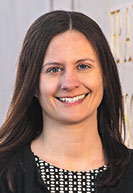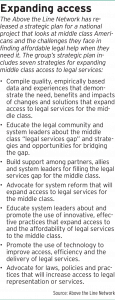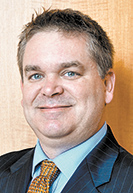Subscriber Benefit
As a subscriber you can listen to articles at work, in the car, or while you work out. Subscribe NowThe search for free or affordable legal services is not just a problem for the nation’s most impoverished citizens.

For people defined economically as middle class, it’s not just an issue of finding money for an attorney, but also of being just “above the line” and not qualifying for some free legal aid services.
To address this legal services gap for the middle class, a pair of organizations have come together to launch the new Above the Line Network project.
The Institute for the Advancement of the American Legal System at the University of Denver and The Chicago Bar Foundation are partnering on the ATLN project.
Organizers describe the project as advancing the CBF’s work in helping legal consumers in the middle class connect with affordable and accessible quality legal services — including through its legal incubator program, the Justice Entrepreneurs Project — and the work of IAALS in helping the legal profession evolve to put client and consumer needs first and enable people of all socioeconomic backgrounds to find the legal help they need.
Jessica Bednarz, IAALS director of legal services and the profession, told Indiana Lawyer that the nation’s access to justice crisis extends far beyond the lower income classes.
The organizations released a strategic plan in September and have had members attend legal conferences to network and advocate for resources to address the access gap the nation’s middle class faces when it comes to legal services.

“We keep finding more and more folks that were targeting this market,” Bednarz said.
Roya Samarghandi, the bar foundation’s associate director of advocacy, innovation and training, said the CBF’s incubator program helps lawyers launch law practices that target underserved middle-class markets.
On the bar foundation’s website, the JEP is described as a program that “provides training, mentoring, and other resources and support in a collaborative office setting to help participating lawyers establish sustainable law practices that provide affordable services to low and middle-income people and small businesses.”
“This is something that’s been evident to our respective organizations for more than a decade,” Samarghandi said.
Gaps in access to legal services
ATLN project organizers define the middle class as those earning at least 125% of the federal poverty line — $18,225 for an individual in 2023 — and up to two times the median household income, or $141,568 for an individual in 2023.
A 2021 report issued by IAALS and The Hague Institute for the Innovation of Law surveyed 10,058 Americans that registered a total of 30,160 legal problems.
 Extrapolating those numbers to the entire U.S. population, the groups found that, on an annual basis, 55
Extrapolating those numbers to the entire U.S. population, the groups found that, on an annual basis, 55
million Americans experience 260 million legal problems.
Of those legal problems, 120 million are not resolved fairly every year.
For 29% of those problems, no resolution is expected in the future, according to the report.
“While low-income Americans are a particularly vulnerable population, this study shows that the need for fair resolution of legal problems is experienced universally across different groups of the population,” the report states.
In terms of the definition used to define the country’s middle class, more than 50% of the nation’s population falls within those parameters.
Samarghandi said a goal of the project is to identify hot spots where access to legal services is most challenging to middle class Americans, as well as finding programs that are already working to address those issues and build an organized network of individuals and organizations that share ideas, resources and best practices.
That could involve major cities, but it also includes rural areas, Samarghandi said, citing an example of a legal incubator project in Montana.
“The reality is whether you’re rural or living in a large city, there’s more attorneys (overall) than ever but there’s fewer people able to access them,” she said.
ISBA also looking to increase access
Joe Skeel, the Indiana State Bar Association’s executive director, is familiar with ATLN and the project’s goals.
Within Indiana, Skeel said he hears feedback in general about a shortage of attorneys and the impact that has in some areas on people’s access to legal services.
“If they are middle class and don’t qualify (for free legal aid), that may fall into that bucket,” he said.

Skeel said ISBA’s board is focusing this year on three particular access to justice areas: the consideration of alternative licensing models and providing legal services in a different way, rural justice, and examining paths to licensure.
The bar has three task forces looking at each issue, with the organization planning to meet at a fall 2024 summit and incorporate each task force’s findings into an overall strategic plan.
Skeel said he thinks the strategic plan will address a lot of legal access gaps in Indiana.
He also said ISBA has looked at other states’ approaches to the issues being studied by the task forces.
However, “We haven’t found a state that is looking at all of these particular issues at the same time,” he said.
Building the network
An ATLN strategic plan released in September includes seven strategies for expanding middle class access to legal services.
Bednarz said the main priority for the project right now is to build a community of legal service providers, with a next step focusing on the strategic plan’s education and advocacy component.
“There’s so much of a need for education,” Bednarz said.
She said the partner organizations are looking to cast a wide net and include attorneys, state bar association leaders, legal educators and judicial officers in the ATLN membership.
There are two upcoming ATLN webinars that look at the issue: “Transforming the Delivery of Legal Services: Unveiling the Above the Line Network” on Feb. 27, and “Tackling Root Causes & Overcoming the Middle-Class Access to Justice Problem” on March 7.
Bednarz said the webinars will take a deeper dive into the middle-class legal access gap, with the March session examining underlying causes.•
Please enable JavaScript to view this content.
